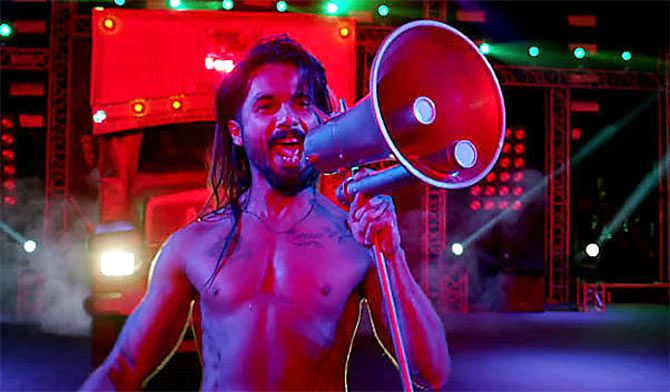
Much as we'd like it to, all hasn't changed.
In our country, the revolution must be polite and careful not to offend.
Still, Raja Sen assures, there is hope.

The masterful Iranian filmmaker Asghar Farhadi once used a fine analogy to describe the shapeshifting state of censorship in his country: 'The restrictions and censorship in Iran are a bit like the British weather: One day it's sunny, the next day it's raining. You just have to hope you walk out into the sunshine.'
In India, things are considerably worse. We cannot remember the last genuinely sunny day, and all filmmakers are handed umbrellas with holes in them.
This week, for example, appears less overcast.
The fascistic Pahlaj Nihalani, much-lampooned head of India's archaic Central Board of Film Certification -- a department straight out of Terry Gilliam's Brazil -- has been rightly humiliated and shamed by the Bombay high court who have struck down the hundred-plus cuts (in 13 separate categories) the CBFC sought for this Friday's release, Udta Punjab.
The film will hit theatres on time and, thanks to the CBFC's infantile attempts to strangle its release, will be seen by far more people than anyone could have imagined. Bravo.
However, the high court itself, while proclaiming that the CBFC is indeed a body for certification and that their job does not include censorship, has upheld one of the CBFC's cuts.
Now, for Indian filmmakers used to the arbitrary whims and inconsistencies of Indian censorship -- where entire movies and documentaries are routinely denied certification, and where directors are often dismissively told to reduce scenes of action and intimacy 'by 40 percent' -- one cut doesn't seem like a big deal.
The film's producers have, understandably, taken the diktat about this one excised scene rather gracefully, and surely couldn't want to fight any more.
(Plus, there is only that much genuine fraternity within the so-called film fraternity, and while it was super to see Karan Johar writing rousing columns and the industry rallying around producers Anurag Kashyap and Ekta Kapoor in unprecedented fashion, nobody expected an actual impasse or other producers to go on strike around the Udta Punjab issue. The show must... and all that jazz, no matter how truncated the show itself gets.)
Yet a big deal that cut is.
It shows that -- much as we'd like it to -- all hasn't changed. In our country, the revolution must be polite and careful not to offend.
Over the last two years, the current government has placed many a peculiar person in charge of our cinema. The massively unqualified and stubborn Gajendra Chauhan presides over the Film and Television Institute of India, following an appointment that led to a 139-day strike.
Rajyavardhan Rathore, the minister for state for information and broadcasting, impressively won a silver medal at the 2004 Olympics, but his only connection with cinema is the tenuous semantic one that points out that they both involve shooting.
And then there is Mr Nihalani, described colourfully by Anurag Kashyap as a North Korean dictator but, in reality, a brown-nosing egomaniac who fails to notice the irony in making tacky videos about erections back in the day and making tacky videos about elections today.
Yet there is hope.
The legendary Shyam Benegal, now 81 and passionate and eminently beyond reproach, was recently given the task to spearhead a committee to look into CBFC reform.
He came away with the strident recommendation -- one most level-headed people in cinema and, indeed, within the CBFC have been demanding for ages -- that the board should merely classify cinema and not, in any circumstances, be allowed to hack away at the filmmaker's work.
Since films with a 'U' rating have bigger chances at the box office and command a fairer price on television, this would certainly lead to some self-censorship but that happens all over the world and is the filmmaker's internal debate. At least there will be no scissors attacking our films.
Or so we can dream, since Minister for Information and Broadcasting Arun Jaitley has promised radical upheaval in the CBFC based on Mr Benegal's recommendations. Fingers remain tightly crossed.
However, Mr Benegal has since said, rather controversially, that there should be an 'Adult (With Caution)' category introduced for films that should not be given a wide-release -- based on excessively adult content -- and should instead be shown in red-light areas and non-residential areas.
Congenial as the image is of the characters in Mr Benegal's own Mandi queueing up to watch the next Human Centipede, this is another tricky boundary. What is excessively adult? Who defines it? And who should be given the power to choose, more than the ticket-buyer?
Despite the high court ruling (mostly) in favour of Udta Punjab, the issues around censorship in India remains incredibly thorny.
Will filmmakers like Kamal Swaroop be able to take the CBFC to court for documentaries like The Battle For Benares?
Will Indian television be able to say 'breast cancer' without, absurdly enough, cutting out the 'breast'?
Will the rules indeed change now?
And if they do, will filmmakers whose films have been savaged beyond recognition by censors in the past apply for fresh certificates in order to bring their original vision to the viewers? Should we all finally dare to watch Dev Anand's Censor and see how much he got right?
For now, despite the fact that we shouldn't discard raincoats just yet, let us look to the future.
Udta Punjab will be out this Friday. Director Abhishek Chaubey must be relieved, and in case that one cut is bugging him a lot -- which it will, and should -- he would do well to acknowledge that pretty much everyone now knows that Shahid Kapoor's Tommy pees on the audience -- the knowledge of that shot, even to those who haven't watched the film yet, might well prove more impactful than the shot itself.
For those up in arms about vulgarity, do remember that there can be no sight as obscene as you not being allowed to see, and remember always what Frank Zappa said. 'There is no such thing as a dirty word.'









